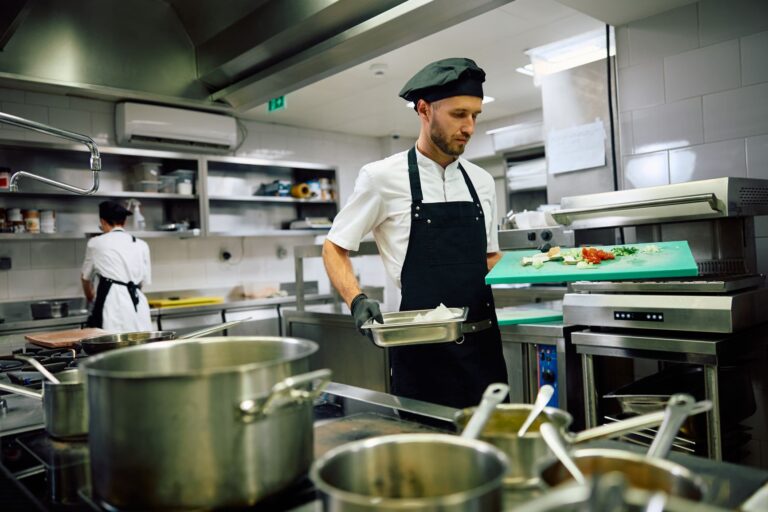To make this measure more effective and tailored to the specific context of your company, we recommend that you first perform an overall analysis of your energy situation.
Replacement and centralisation of cold production units with a variable speed compressor
In a restaurant, the cold room’s refrigeration cycle is often subject to variations in operation.
The air evaporator is influenced by the climate of the room it cools (opening and closing of doors, loading of food, etc.) while the condenser also depends on the climate through the outside temperature.
The project consists in replacing small production units supplying cold rooms with a main, centralised cold production unit, controlled with a frequency variation on the refrigeration compressor motor.
By installing this technology, which has been available on the market for more than 5 years, the company can save up to 15% on its electricity bills and reduce its carbon footprint. However, implementing this measure can be complex and requires the temporary shutdown of production during the technical installation stage. But the return on investment will be fast thanks to the savings achieved.
Energy and environmental impact
The new centralised refrigeration unit will result in energy savings on two levels:
- improved refrigeration efficiency
- improved control due to speed variation
State subsidy application
State subsidies
Please note: any application for government or non-government subsidies must comply with the “incentive effect”, subject to compliance with the subsidy conditions.
To ensure that the ‘incentive effect’ is respected, no binding commitment (signing a quotation; paying an advance) may be made BEFORE submitting the application file or receiving the agreement in principle from the State or the electricity and natural gas supplier following an application for subsidies.
- Financial Aid for small and medium-sized enterprises covering up to 70% of eligible costs for the implementation of a project aimed at reducing the environmental impact. The eligible project budget must be in a range from 3.000 € to 25.000 € excl. VAT.
- For more information:
- Chambre des Métiers for craft companies
- Chamber of Commerce for businesses in the non-craft sectors
Environmental protection scheme – Investment aid for the protection of the environment
- Verification of company eligibility and costs: General Directorate – Industry, New Technologies and Research
- Support in drawing up the subsidy application file prior to submission to the Ministry of the Economy
- For any questions: Luxinnovation
- More information and recommendations for companies on investing in the environment are available in the Guide simplifié pour les entreprises (Simplified Guide for Businesses)
- Support in drawing up the subsidy application file prior to submission to the Ministry of the Economy
N.B. State subsidies cannot be combined for the same project
Subsidies from electricity and natural gas suppliers
Since 2015, natural gas and electricity suppliers are required to make energy savings for consumers under the obligation scheme. Since then, energy suppliers have been offering support and advice, as well as subsidy programmes for consumers to implement energy efficiency measures.
The following suppliers offer this service for companies:
N.B. Supplier subsidies can be combined with any state subsidies for the same project.
